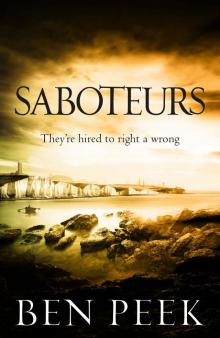The Godless Read online
Page 11
Finally, on a cold morning, he took one of the metal traps from the village and entered the snow fields to the north, with his white bearskin cloak around him. The stripped-bare trees watched him bury the trap at the edge of the Hoewa River, where the water did not entirely freeze no matter how cold. He settled back into the snow and waited.
It was a long wait. The empty, cold sky lit with the orange of the afternoon’s sun and the cold set into his bones and he told himself he was a fool. Yet he stayed. Snow blanketed him. The ice in the river broke, the sound harsh and primitive. More than once he told himself to stand, to walk back to Kakar, but he never moved.
And then, finally, a stag stepped into the trap.
The metal crunched through bone, the animal cried out. It was young, its antlers not yet fully grown, and it thrashed against the trap, drawing on the chain spike that held it to the ground. Raising his crossbow, Zaifyr sank a bolt into its neck and saw it stagger and sag. Rising, his cloak dislodging thick snow as he did, the charm-laced man approached the dying animal and watched. He longed to shoot the stag again, to end his misery, but he had laid the trap for a reason and he would not weaken now.
The stag’s breathing rasped, its dark eyes at first staring wildly at Zaifyr then blankly past him. He focused his attention on the animal’s chest, watching the final rise of it with such attention that he saw a faint outline at the edges of the body, saw the shape of the stag rising. The sunlight broke through it as if it were smoldering and Zaifyr could sense the animal’s confusion, hunger and cold.
The stag moved, but not far. It appeared to be waiting, but there was nothing, Zaifyr knew, that would be coming for it.
There were no more gods of death, no more gods to take the souls of the living and lead them to paradise, to rebirth, to oblivion. There was only him to bear witness, only he that could see what happened to the souls of the living, only him, who had, despite the charms he wore, the charms that had protected him from his god, found himself changed by the Wanderer’s death.
Zaifyr turned and began walking back through the bare trees without the carcass, unable to bring himself to take it.
8.
“I thought I smelled something foul.”
“It’s a delight, admit it.” The door closed solidly behind Bueralan. “I found this perfume just for you.”
Across from him, Aerala wrinkled her nose in distaste. Wearing a long, thin green skirt and a brown singlet, the dark-haired, olive-skinned archer lay in a hammock, swaying slightly as her foot pushed against the rope pegged in the wall. In her lap was a half-filled parchment and as he entered she placed a quill into a small well at her side. “It’s no wonder your romances never end well.”
Bueralan chuckled and placed his axes on the weapon rack, noting with satisfaction that the weapons there had been clean and sharpened already. “Where the others at?”
“Dinner.”
“I hope they don’t come back drunk.”
“Mercenaries don’t drink in this town,” Aerala said. “Though your smell would make me risk the gibbet of Lady Wagan.”
He lifted an arm, sniffed. “It’s that bad?”
“You have no idea.”
Grimacing, the saboteur continued through the barracks, picking up a cake of rough, yellow soap and a towel as he reached the end. A small room built upon a cement block with a claw-footed bath awaited him. The water he poured into the basin came from pipes in the floor, which were connected to a series of tanks beneath the city. The huge, bronze containers had originally been put in so that the city would not have their water supplies cut off in a siege, though they had since then been adapted to use the heavy summer rain falls more industriously. There were coals beneath the bath, but after thrusting his arm beneath the cold running water and feeling the freshness against his skin, he sank in straight away.
Once he had finished bathing, he drained the tub and refilled it, lighting the coals this time. As he lay in the clean, warm water, his mind drifted. He thought about the Quor’lo, the Lady Wagan, the money and the mystery that lay in Leera. That, he had to admit, he still did not like: the mystery was not one he cared to solve with the lives of Dark. But Heast had surprised him, in the last moments of their meeting.
“Samuel Orlan will be traveling with you,” the Captain of the Spine had said.
Hand on the door to his office, slants of lamp light cracking through the opening, Bueralan paused. “That’s quite an honor,” he said, finally.
“It is,” the other replied. “He visited me this morning to tell me just that.”
The door closed. “He told you?”
Heast was silent. When Bueralan turned, he found that the old soldier’s pale gaze was not focused on him. “In Mireea,” he said, finally, “I watch everyone of consequence. For the most part, it is a little bit of history, investment in politics. My knowledge comes from contacts, spies and simple intuition. No one is beyond me in this city, not even Keepers. But Orlan … Samuel Orlan I know very little beyond his considerable reputation. Sometimes I know when he leaves the city. I know the hours he keeps when he is here and they are erratic and I do not know what changes them. I do not know who tries to win his favor or influence him. A part of me even believes he is making a game out of this knowledge, a test between two old men. If that’s so, it is not a game between equals.”
“I would rather he not ride with us,” he said.
“I could not say no.” Heast’s pale, cold gaze met his. “Do you understand, Bueralan? As he stood before me, I saw a small, fat man with no military training whatsoever. I saw a man who I know intellectually will be not only be deadweight to you in any fight, but who will also slow you down and put you in a greater danger. Even his knowledge of the land does not compensate for this. Yet, I could not tell him no. I hinted at it, suggested that it might not be wise of him, but he looked me in the eye and told me that he was not asking, he was telling me. I was nothing but a pause in thought. A curiosity. A kindness.”
“What game is he playing at?” he said. “Is it vengeance? The Quor’lo did come into his shop and attack his apprentice. He lost years of work, maps of importance never to be returned to history.”
“I do not believe Samuel Orlan is a man of vengeance.”
Bueralan let the memory drift away. Heast could add no more, and it became clear that the Captain of the Spine did not want to keep him in Mireea. The awareness sat poorly, if Bueralan was honest. The exiled Baron of Kein had once been a man of some importance, both in title and reputation. He had watched politics, taken part in it, enjoyed it. He had lost his nerve at the end when the stakes were at their highest, when a queen could have fallen, but he had never left the world of politics. He was a shadow in it, a politician made into a soldier, a saboteur who stood on the sides of other people’s plans.
Before Elar, he had not lost a man or woman in seven years. He had forgotten how much it could hurt, all of Dark had, and it was part of why they had agreed to Heast’s offer. The decision had not been made on facts, on money, on success: it was about forgiveness and the memory of the man they had lost. Now, however, he felt as if he had agreed to something that was verging on being large, violent and costly.
He had no doubt who would be asked, first, to pay the price.
9.
As the years progressed, Zaifyr became isolated in Kakar. His companions—once men and women of flesh and blood adorned with charms—became spectral figures, their bodies broken apart by cold light.
He recognized the change but could do nothing to stop it. In the home of his parents, haunts of the merchant and his guards walked through the walls, followed him in his chores and stood over him while he slept, murmuring in a language that he did not understand. Exhausted, he would fall asleep and awaken to their nonsensical whispers, with no beat skipped. They were angry at him, vengeful, but he could say nothing that they would understand. They left him alone only when he approached Meihir. In her lucid moments, she admitted to not knowing why th
ey treated her so, but those moments were fleeting as the seasons changed, increasingly so.
He felt, as he stood apart from the living in the village staring up at the piles of snow around the edges of the houses, that he ought to be able to do more for the dead. He could not explain why he felt that other than a part of him, watching the reflected light pierce through their shambling bodies, felt more than his share of responsibility for what had happened. He had killed only one but had been responsible for the deaths of the others.
He discovered early that the haunts would not follow him out of the village. They were tied to the bodies that had been brought back and buried, or so he theorized. Each haunt had a range, and though it was not consistent, he knew that after a mile or two of travel, he would see none of them. Eager to find solitude, he began keeping to the caves that dotted the bases of the mountains. Lighting torches, he discovered that they were unoccupied, and he began to store dry wood and blankets there so that he could read the limited library that he owned. In the summer, he told himself he would ensure that the library grew in the hope that his intellect would one day equal the position he found himself in. He would have to leave Kakar and learn a new language to do it. Wrapped in his cloak, he felt the limitations of the world he had been born into and experienced both its inadequacies and his own. He could not explain what was happening. As he stared out of the cave and watched the faint, broken shapes of animals picking their way through the snow, he felt overwhelmed by what he was experiencing.
In the evenings, he would return to Kakar where, joined with the haunts of a witch, a merchant and the guards of the latter, that horror continued. From the moment that food was prepared, be it stag, pig, fish or whatever meat was cooked in the blackened pits of the village, he was stalked by the haunt of the beasts. Within a week, he had taken to eating his meals away from the others, pulling what he ate from the gardens that they kept. As Zaifyr trudged through the snow back to the village, he knew that unless he discovered a way soon to control what he saw and retreat to the ignorance he had only a short time ago, he would stop returning every night.
As he continued, the sound of breaking snow soon merged with words. It took a moment for him to recognize that those words were not ones that he recognized—and that they spoke loudly, commands being issued and obeyed. Stopping, he dropped into a crouch and focused, noticing for the first time that the trails of smoke that rose through the winter-stripped trees were thicker, blacker than they were, fueled by a tartness in the air. It took another moment for him to realize what it was that he smelt, and by then he could see the broken forms of those he lived with, around the snow mounds and outlines of huts.
Slowly, he crept forward, a cold dread settling into him. The center of Kakar was dominated by a huge fire reminiscent of the one that they had created for their families that he barely registered the sight of the horses, big, heavy roans covered in leather and snorting white with riders in leather and cloaks of red and gold. Soldiers, a part of him whispered; but another saw only the bodies on the fire, the bodies of his friends. There were soldiers there as well; their victory had not come lightly.
If he could have turned and left then, stalked the soldiers back to their city or run in and attacked to die with those who were his family, Zaifyr never knew. As he rose, he heard behind him a faint crunch of snow, a footstep, and he turned in time to see a dark-haired man without the red cloak leap at him. Caught off guard, he swayed, but the man had the better of him until Zaifyr slammed his head forward, crushing the man’s nose, a blow he returned by jamming his knee into Zaifyr’s groin. Slamming his head forward again, he pushed the man back, punching him as he rose to feel a knife touch lightly against his throat.
Words were said. Words he did not understand.
But the intention was clear, and hours after he had been tied, after he had been thrown into the back of the wagon that had belonged to the merchant, days after he spent a week next to eight bodies wrapped in red cloaks, months after he was kept in a dungeon and years after being kept on display as a savage, a man in charms who did not appear to age, thirteen years before Jae’le walked into the marble palace of the Emperor Kee to claim him, Zaifyr wished that he had not understood enough to surrender.
For thirteen years, he wished that the prophecy of Meihir had been true, and he had died at the age of twenty-nine.
10.
Ayae managed to be alone for but a moment: at the edge of the tower wall, her hand pressed against the door that led into the dimly lit hallway that flowed on to stone stairs deep in the Keep, and she took a breath to center herself. She was more frustrated than angry, but there was no denying that it was the second emotion that urged her to act irresponsibly, to lash out. As her breath expelled, she tried to put both emotions from her mind as she pushed open the door, her low escaping breath blowing into Reila on the other side.
“The Lady Wagan,” the small woman said without pause, “would like to meet you.”
Ayae nodded.
As they walked, Reila asked about Ayae’s health—physically first, then mentally, focusing on the latter she thought. Ayae attempted to keep the frustration she felt from being with Fo and Bau out of her voice, but noticed the more she talked, the more a small frown creased Reila’s aging face. She did not speak again until after Reila opened the door to Lady Wagan’s office.
What struck Ayae immediately was the confidence and intelligence of the large woman sitting before her. She had seen her before, of course: before the Lord Wagan returned blind and mad from Leera, the Lady had been seen in the markets, meeting merchants, holding conversations with those who had made her city the power it was. Limited as Ayae’s sight of the Lady of the Spine had been, she had not been shocked Lady Wagan placed a mercenary in a gibbet for his crimes before dismissing his entire company. She had seen that in the Lady’s eyes.
“You have met our Keepers,” Lady Wagan said, indicating to a chair in front of her. “A delightful pair, are they not?”
“I was charmed,” she replied evenly.
A short laugh escaped Lady Wagan. “Did they murder small animals in front of you?” She pointed to another chair. “Sit, Reila.”
The other nodded, easing into the chair as the Lady turned her attention back to Ayae. “I want you to know that if I’d had it my way, I would not have you keep company with those two men. But while I may run the Spine, I do not have it my way with those two. The ties that run between Mireea and Yeflam are deep and sordid and I have to remain civil to them, especially now. Do you understand that?”
“Yes.”
“You don’t like it, do you?”
Ayae hesitated, then said, “No.”
“I don’t like it either.” Lady Wagan’s gaze did not leave her. “Captain Heast tells me that the attacks on our outlying villages have stopped, that the last village they found was attacked over two weeks ago. In part, he says, the attacks have stopped because of our evacuations, but it is also his belief that with the wet season ending, a lull is being allowed to develop before the main attack begins. He suggests a month before we hear again of raids, but I think it will be half that—and I find myself in the curious position of deciding what to do with those two men in the tower.”
“You want me to spy on them?” she said.
“We already spy on them.” The light flickered across the wall behind Lady Wagan, shadows spiking sharply. “What I want to know is how to stop them, if I need to do so.”
“They won’t trust just anybody,” Reila added quietly. “They do not see themselves as being human any more.”
“I have heard that before.”
“You’re Mireean, Ayae, no matter what anyone says,” Lady Wagan said, simply. “You may not like it some days. I certainly do not like it some days. I long to be somewhere else. Somewhere without war, without responsibility, but I am not. Neither are you. We are both Mireean. I have no doubt someone has said cruel words to you, but it will not be long until a kindness is said.”
<
br /> She sighed. “I don’t know how to stop them.”
“But you may. The more you learn about yourself, the more you will learn about them.”
Silence threaded between the three women, a long, difficult silence as the implications of what Muriel Wagan asked became clearer to Ayae. She wanted the cartographer’s apprentice not just to spend time with the two Keepers, but to put aside the regaining of her life. She would not be able to return to help with the rebuilding of the new shop, would not be able to continue with her studies. She was being asked to take part in politics, to put herself in danger, when all she wanted was to step back from what had—in her mind—already pulled her too far into that world.
“You’re asking a lot,” she said, finally.
“I know.” Lady Wagan’s gaze never left Ayae. “But there are vital things at stake, young lady. It is not just your home, but all our homes that will be lost if we don’t work to save them from the Leerans and the Keepers. That last is to be kept between us, but it is important that you understand clearly that we are caught between two forces here. As Leera draws closer and closer, internal politics in Yeflam will force the Enclave to set aside its neutrality. People will die. Mireean people will die, just as Leeran people will. This is a very real problem that we have and while I do not wish to make you spend time with these two men, it is only you that they have allowed into their world, only to you that this opportunity has been presented. Don’t you agree?”
For a moment Ayae felt alone, more alone that she had felt since awakening in the hospital. She did not want this. She did not want to be drawn into conflicts, into political and physical fights. She had been content, happy with her life, and she wanted to restore that feeling, that sense of safety she had had since she had arrived in Mireea, that sense of having a purpose as her career as a cartographer’s apprentice and illustrator grew. These things were important to her. She had lost too much in the fire of Orlan’s shop. She had lost her sense of security, of safety. She had lost Illaan. Their relationship had not been the best, but even at its worst she had been … if not in love, then loved and cared for. She had seen too early in her life how the loss of all the things that defined an individual stripped them of their humanity, how it made them emotionally rough, and she did not want to become that. She wanted to restore her life. She wanted to fix what had been broken in the hours after the charm-laced man had pulled her out of the fire.

 Saboteurs
Saboteurs The Godless
The Godless Leviathan's Blood
Leviathan's Blood Dead Americans
Dead Americans The Eternal Kingdom (The Children Trilogy Book 3)
The Eternal Kingdom (The Children Trilogy Book 3)